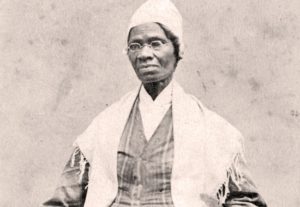
Abolitionist and women’s rights activist Sojourner Truth.
Like Harvard University, Georgetown and other colleges that have made efforts to atone for their roles in the the enslavement of Black people, Rutgers University is looking to do the same through a new book titled “Scarlet and Black, Volume 1: Slavery and Dispossession in Rutgers History.”
According to USA Today, the groundbreaking book was the result of eight months of research, which revealed that some of the university’s founders were slaveholders. It also showed that many Native Americans were displaced as land was transferred to the college.
The bombshell revelation, however, was that the family of abolitionist and women’s rights activist Sojourner Truth was owned by the family of Rutgers’ first president, Jacob Hardenbergh. The book also the chronicles the mid-18th through mid-19th centuries and features stories of revolutionaries like Will, an enslaved Black man who laid the foundation for historic university building Old Queens.
The research project came about after Rutgers University-New Brunswick Chancellor Richard L. Edwards created the Committee on Enslaved and Disenfranchised Populations in Rutgers History in fall 2015, USA Today reported. The idea for the much-needed committee was borne out of a meeting between students and faculty on how to improve the racial and cultural climate on campus.
“This work shows that we are not afraid to look at ourselves and our early history,” Edwards said. “We are a large public university that is one of the most diverse in the country and we think we need to understand our history and not be ashamed of it, but to be able to face it in a forthright way.”
Rutgers is yet another in a string of universities nationwide working to come to grips with its slaveholding past. Earlier this year, Harvard University honored four enslaved workers who contributed to the campus by dedicating a building to them. Georgetown University followed suit by extending legacy admission privileges to the descendants of 272 enslaved Blacks who were sold in 1838 to keep the institution financially afloat.
At Rutgers, the names of university leaders who had a direct hand in maintaining slavery and the slave economy can still be found on buildings and roads in and around the campus — like university founder Philip Livingston, who worked as a slave trader and slave owner, and the university’s first instructor, Frederick Frelinghuysen, whose family also owned enslaved Africans and played a major role in Rutgers’ early beginnings, USA Today reported.
The book goes on to note that the university’s namesake, Henry Rutgers, like other school leaders, was a slaveholder but was active in the American Colonization Society, a group that advocated for the resettlement of enslaved peoples in Africa.
A team of faculty, graduate and undergraduate students spent months sifting through records that included wills, speeches, journals and manumission records in an effort to piece together the narratives of enslaved peoples at the university. Rutgers officials said the research is expected to continue with the goal of creating a post-doctoral position aimed at examining the experiences of African-Americans and Native Americans at the university through the 20th century, the news site reported.
“I want our African-American students to be proud of Will and to understand that their ancestry helped build the university,” said Deborah Gray White, a professor of history and chair of the slavery and disenfranchised people’s committee. “I want New Jerseyans and Americans to understand that African-Americans were integral to this nation even though we came here in chains, and we helped build America.”
“This is not a way to tear down the university or diminish it, but it is a way to celebrate it and go forward,” she said.


